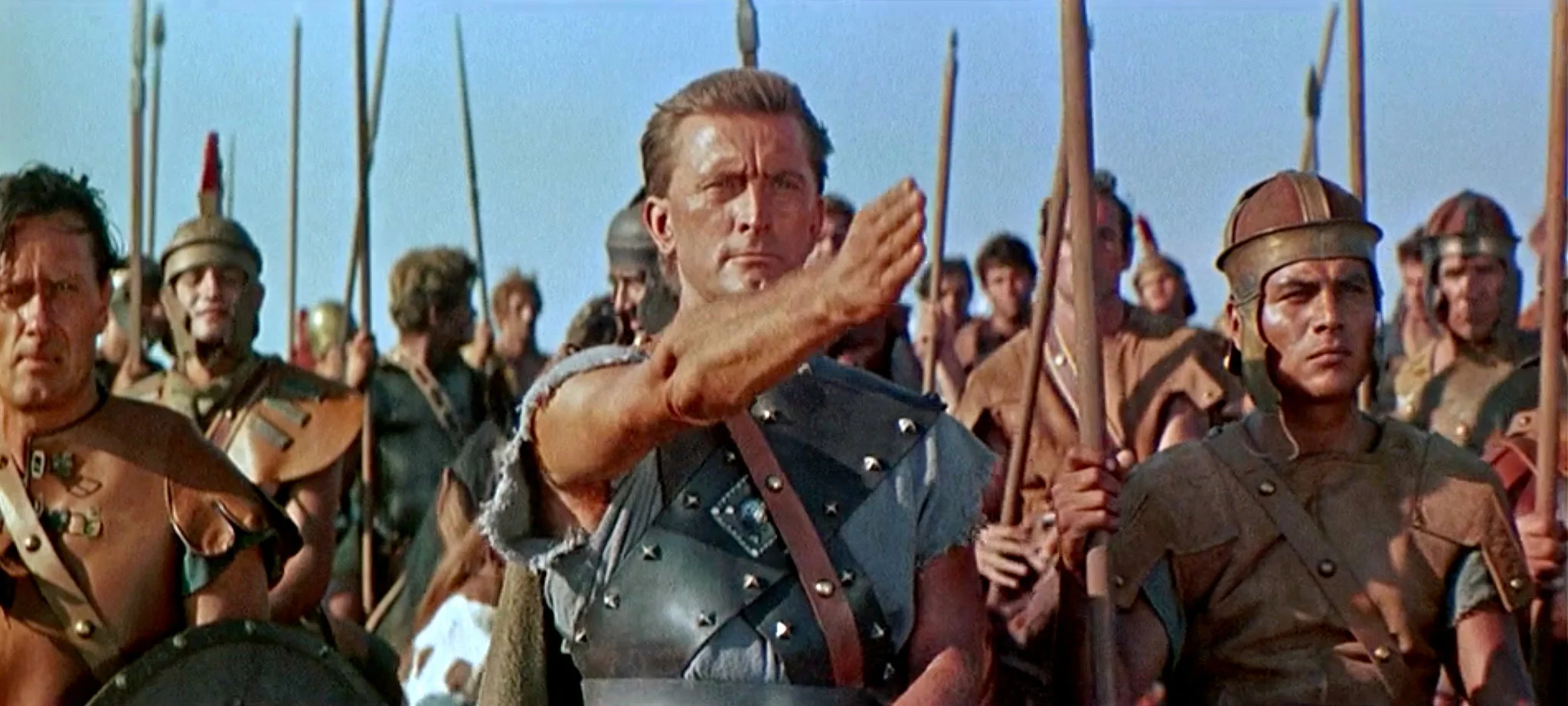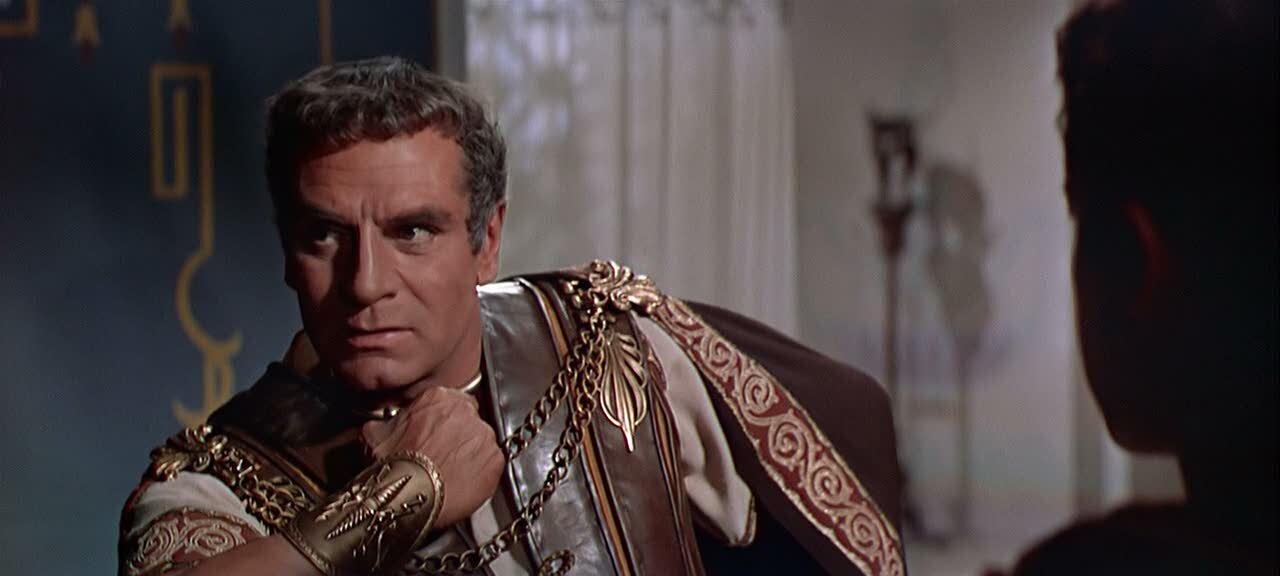Spartacus (1960)
Written by Dalton Trumbo
Directed by Stanley Kubrick
1998 List Ranking: NA
2007 List Ranking: 81
I think I first heard the phrase “I am Spartacus!” back in the 90’s, when my grandfather took me to see the film That Thing You Do! in theaters (by the way, if you haven’t seen that film, do it!). It’s a somewhat-often repeated phrase in that film, so I’ll admit that I was interested to see how it and Spartacus were connected.
It turns out that they…aren’t. Besides the phrase, I really didn’t see how anything in this sword-and-sandals epic relates to anything in that film of a 1960’s one-hit-wonder band. But, we aren’t here to discuss that later, better film. Let’s dive into Spartacus.
Spartacus (Kirk Douglas) commands his fellows slaves into battle
Spartacus is a slave from birth with a penchant for disobedience. He is sold to a gladiator training camp, where, after grueling training and being forced to fight to the death, Spartacus and the fellow slaves decide to fight “The Man” and escape. They burn villages and rescue slaves, all in an attempt to escape Italy to have true freedom. Meanwhile, there’s something or other about a power struggle in Rome (featuring the beginning of the rise of Julius Caesar); somehow that struggle means the Roman army needs to fights the rebellious slaves, plot ensues, lots of people die.
Kirk Douglas as Spartacus
While there are some good things about Spartacus, Kirk Douglas in the title role is, unfortunately, not one of them. It’s not exactly that he’s bad, but it’s more that he’s just BORING. He spends 3+ hours with basically the same facial expression, regardless of what’s going on around him. Added to that is the fact that Spartacus has no faults or flaws: a good hero needs something internal to overcome, some sort of emotional journey or arc to complete. Spartacus reacts merely to external factors, but there is no internal journey he undertakes. He wants to be free of slavery, and he accomplishes that at the end of the first act; the following two acts feature no changes to his goal nor any shift in his beliefs or emotions. In short, while he might be a good actor, Douglas is perhaps the most boring leading man I’ve seen in a while.
Olivier as Crassus
The other major star is Laurence Olivier as Crassus, a senator with aims of becoming the emperor of the failing republic. Like the other films I’ve seen him in, Olivier plays dark and brooding fairly well, but he doesn’t exactly show a lot of range (except in one regard, which I’ll discuss in a moment). In fact, as I think about it, most of the actors play a very limited range: everyone is sad or angry, and there is very very little joy or laughter throughout the film. 3+ hours of that can feel very draining after a while.
The sheer number of people in this shot is astounding
Let’s get some of the good things about the film out of the way. First, there is some good tension that is built as Spartacus awaits his fight-to-the-death at the training camp. Another pair is selected before him and his opponent, and rather than showing THAT fight, we instead focus on Spartacus and his opponent as they listen to the fight. It’s a great little decision that increases both the characters’ and the audience’s anticipation. Also, the sheer epic spectacle of the film cannot be ignored: from the slave revolt, to the burning of villages, to the massive armies marching to war, there is just something wholly impressive about watching these types of things being able to be achieved and knowing that it’s real; where today we can see something like that and just chalk it up to special effects, here, this is just thousands of people performing right for the camera. Additionally, when compared to Gladiator, which was released 40 years after Spartacus (and, on reflection, borrows a TON from it), the depiction of Italy is much more beautiful: lush rolling grass fields, as opposed to Gladiator which relied heavily on the dirt of the Coliseum. Granted, none of Spartacus was actually filmed in Italy, but it just looks better.
The biggest problem with this film, like Laurence of Arabia a few years earlier, is its sheer length. I’ve said before, and I stand by it, that I have no problem with long films. The problem with long films of this era is that they are unnecessarily wrong: There are just long, slow scenes that don’t show or tell us anything new. Or, if they do, they either take forever to get to the point or make the point quickly and then just continually hammer it in. Granted, I’m seeing these films with a modern perspective, where so much can be achieved with a nonverbal glance and a few choice words. This is certainly a style of the time, but it makes the film feel slow and boring. Shave an hour off of this thing and it would probably feel a lot better.
Crassus makes Antoninus (Tony Curtis) bathe him
There is a very interesting aspect of this film that, had I not known something about it beforehand, I probably wouldn’t have picked up on it, and that’s a subtext of homosexuality. Now, it’s 1960, so there’s nothing deliberately overt about it, but there is a subtext that can be interpreted, especially regarding the character of Antoninus, played by Tony Curtis. Olivier’s Crassus speaks in metaphor, as he makes Antoninus bathe him, about sex with both men and women (the metaphor used here is oysters and snails. Gross.). Later, when he sees Antoninus and Spartacus as friends, he demands that they fight to the death, and the winner to be crucified. There is a certain longing on Olivier’s face as he sees them and makes his decree…could it be heartbreak with a side of jealousy? Finally, there’s that final fight between Antoninus and Spartacus; each is determined to kill the other just to save him from being crucified. There’s a love between the two men that becomes evident as they each try to bring death quickly to the other.
Overall, there are some strange problems with this film. It’s overly long (the third act gets…better?), Spartacus has minimal dialogue throughout the first act, the final battle between the Romans and the slaves, while it has some good (and surprisingly gory) footage, begins anticlimactically, and for some reason all the Romans have British accents. The moments of good don’t come anywhere near the long list of moments of bad, so it ultimately just feels like 3+ hours I’m never going to get back.
(Okay, but seriously, WHY does the drummer in That Thing You Do! keep mentioning the “I am Spartacus!” line? WHAT IS THE CONNECTION???)
FINAL GRADE: C-







